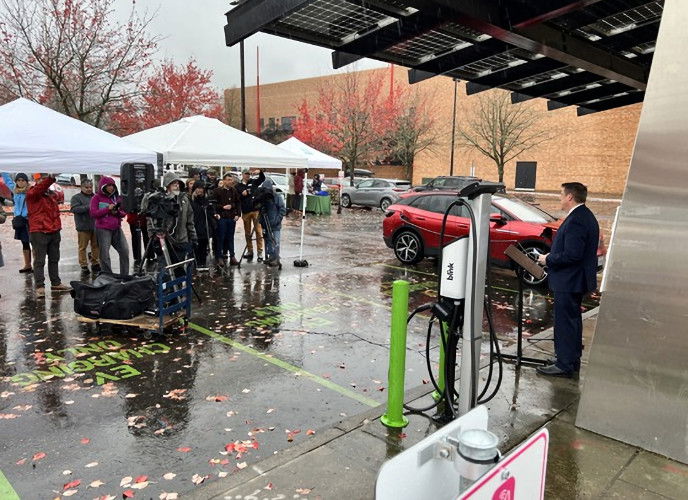State agencies celebrate green milestone as Oregon tops 100,000 registered electric vehicles

PORTLAND, Ore. (KTVZ) – Oregon’s push for a greener future got a major boost earlier this year when the state surpassed 100,000 registered electric vehicles, ODOT said Monday. The milestone, marked at Portland event Monday, will mean fewer emissions from the transportation sector and across the state, the agency said.
Representatives from the Oregon Departments of Transportation, Energy and Environmental Quality gathered at the Oregon Museum of Science and Industry in Portland Monday to celebrate the milestone with a news conference.
Directors from each agency and OMSI President and CEO Erin Graham spoke about the state’s progress to electrify transportation and reduce emissions from transportation, which account for about 35% of the state’s total greenhouse gas emissions.
Oregon crossed the 100,000 registered electric cars, SUVs and light trucks threshold in July, according to DMV registration data. As of August, there are about 102,400 registered EVs throughout the state. That number includes both battery electric vehicles and plug-in hybrid vehicles.
Other event attendees included Sen. Janeen Sollman, a representative from Sen. Aaron L. Woods’ office, and members of transportation electrification nonprofit Forth.
Closing gaps in public EV charging infrastructure
ODOT director Kris Strickler emphasized his agency’s work to close gaps in Oregon’s public EV charging infrastructure, particularly in rural and disadvantaged areas of the state.
“ODOT is funding a reliable and accessible public EV charging network that meets drivers where they are, whether that’s at work, school, or out exploring our state,” said Strickler. “A robust public charging network gives folks the confidence they need to make an EV their next vehicle.”
Strickler touted ODOT’s Community Charging Rebates program, which funds Level 2 charging station projects at multifamily homes, workplaces, and publicly accessible parking areas. The rebates program funded a public EV charging station project at OMSI in 2024.
As of this mo 2024, the rebates program has distributed $4.2 million to nearly 190 charging station projects in 27 Oregon counties. Over 75% of those projects are in rural or disadvantaged communities.
ODOT also oversees federal grant programs that fund repairs and upgrades to broken public EV charging stations, and new public EV fast charging stations along Oregon’s major roads.
DEQ’s Oregon Clean Vehicle Rebate Program helps drivers transition to EVs
DEQ Director Leah Feldon discussed the impact of the Oregon Clean Vehicle Rebate Program on the state’s transition to electric vehicles, which is important to reduce transportation emissions and improve public health. The rebates greatly assist when purchasing or leasing EVs, especially for low- and moderate-income households, which are often disproportionately affected by poor air quality.
“It’s clear people in Oregon are making the transition to electric vehicles. As of early November, DEQ has distributed more than 33,000 rebates across Oregon, which adds up to over $99 million. That means more than one-third of the 100,000 battery electric and plug-in hybrid cars, pickup trucks and SUVs registered in the state have received an Oregon Clean Vehicle Rebate,” said Feldon. “It’s important to note that more than $30 million of that rebate funding has been distributed to low- and moderate-income households.”
Since 2018, the agency has offered its Standard Rebate for those buying or leasing new eligible electric vehicles, and its Charge Ahead Rebate for low- and moderate-income households buying or leasing new or used eligible electric vehicles. In some cases, the two rebates can be combined to receive up to $7,500 back.
Feldon emphasized DEQ’s receipt of an additional $30.5 million for Charge Ahead Rebates through the EPA’s Climate Pollution Reduction Grant. The extra funds will allow DEQ to help even more low- and moderate-income households purchase or lease electric vehicles starting in 2025.
DEQ also offers various grant and incentive programs to support the transition to electric medium- and heavy-duty vehicles.
Accelerating Oregon’s electric vehicle transition
Transportation accounts for the largest share of energy use in Oregon. In fact, according to the recently released 2024 Biennial Energy Report, the transportation sector is the largest contributor of greenhouse gas emissions in Oregon, at over a third. However, ODOE works to help increase the use of renewable, cleaner alternatives to petroleum-based fuels and supports the transition to electric technologies and implements policies that decrease carbon emissions.
“We’re able to celebrate today’s 100,000 EV milestone thanks to the ongoing coordination with our fellow state agencies, including ODOT and DEQ,” said ODOE Director, Janine Benner. “We also appreciate the partnership with local organizations, including Forth and the Oregon EV Association, which help to make EVs more affordable and accessible to all Oregon drivers.”
###
Oregon’s transition to electric vehicles and infrastructure is key to the state’s efforts to reduce greenhouse gas emissions from transportation, a core driver of climate change. ODOT’s latest data shows that by 2050, Oregon is on track to reduce transportation emissions by about 60%.